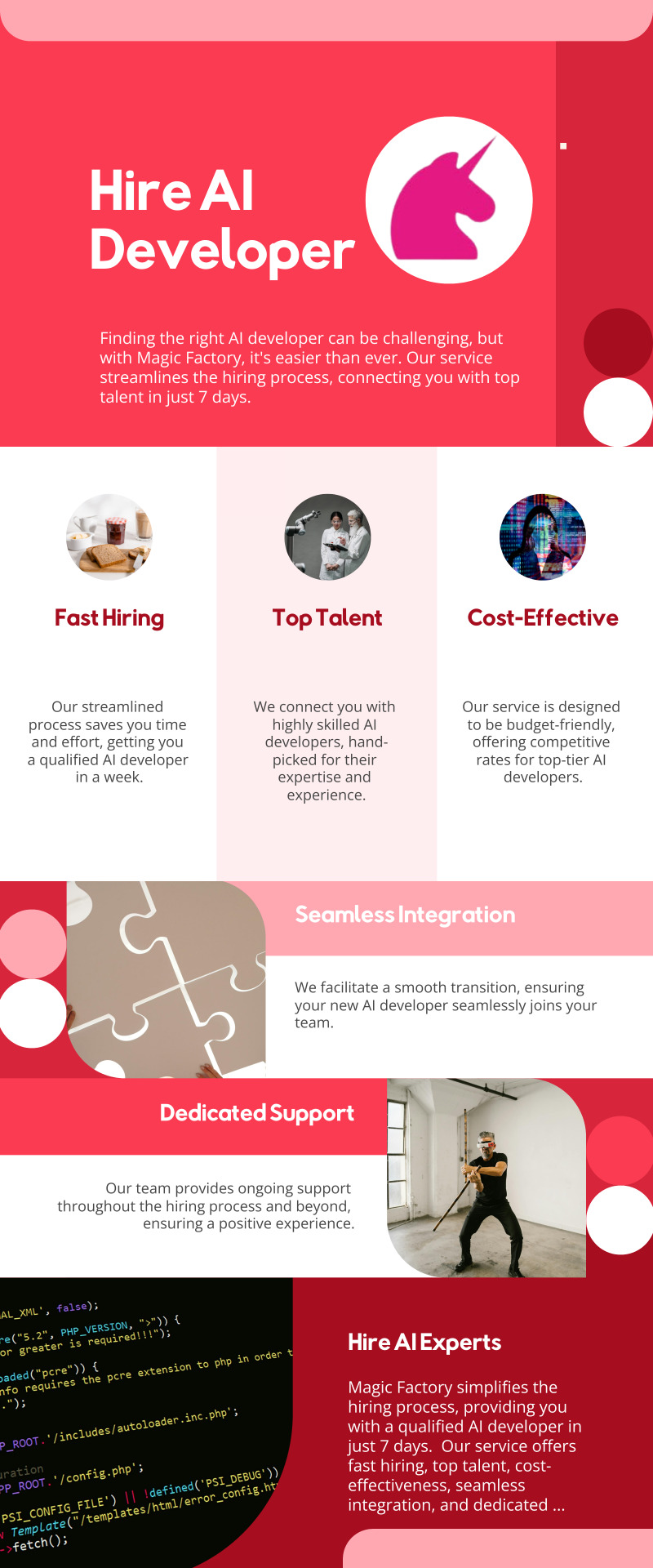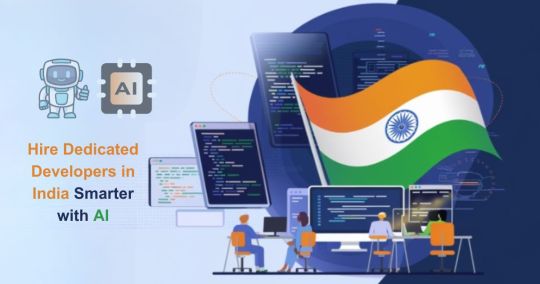#Hire Remote AI Developer
Explore tagged Tumblr posts
Text
Hire Artificial Intelligence Developers
0 notes
Text

Visit - Magic Factory
0 notes
Text
In-House vs. Remote: What’s the Best Way to Hire a Computer Vision Engineer?

Computer vision has been reshaping industries from facial recognition, autonomous vehicles, to medical imaging and retail analysis. As demand proliferates, so does the challenge to find the right experts. Whether a startup or a growing tech company investing in AI, the key question in the picture is: should you opt to hire remote developers or in-house professionals for computer vision roles.
Both options offer their own pros and cons, but the best choice depends on your project scope, budget, and team structure. To understand this in more detail let’s read furthermore.
In-House vs. Remote: What’s the Best Way to Hire a Computer Vision Engineer?
Let’s first explore the traditional and most-preferred hiring approach of in-house developers. Hiring computer vision engineers in-house brings obvious advantages, especially when your project involves ongoing development, close collaboration, or sensitive data.
Having a dedicated engineer on-site will make it easier to coordinate with product managers, data scientists, and developers. You must opt for in-house when:
You must work closely with cross-functional teams.
The project is crucial to your roadmap for products.
Working with sensitive or private datasets.
You intend to make long-term innovation investments.
An internal computer vision specialist can fully own the design of the vision system, contribute continuously to the tech stack, and become a part of the corporate culture.
Why Remote Hiring Is Gaining Ground
Unlike advancements in technology, hiring approaches have also evolved, especially post-pandemic. Hiring remotely from a global talent pool has become a preferred approach among several tech companies and startups.
Many tech companies now prefer to hire AI engineers remotely - especially when looking for rare or specialized skills. Remote hiring offers you access to a global talent network, growing your chances of finding the exact expertise you need. Go remote when:
For a particular use case, such as object tracking or picture segmentation, you require a specialist.
Hiring time is crucial or limited.
You're operating on a tight budget.
You desire flexibility without committing to anything long-term.
Hiring remote developers lowers overhead expenses, particularly in the fields of AI and machine learning. In many areas, pay can be lower without compromising quality, and there's no need to move staff or offer office space.
Consider Hybrid or Project-Based Models
Sometimes combining the two is the best course of action. As you gradually assemble an internal team, you may hire a remote engineer for temporary project or consulting work. This enables you to make rapid progress while developing long-term skills.
Depending on the size of the project, many teams also employ ML or AI engineers to collaborate with computer vision experts. A flexible model keeps your core staff small and concentrated while filling in gaps.
Tips for Hiring the Right Talent
Hiring the best candidate, whether in-house or remote, necessitates having a thorough grasp of your requirements. Identify the precise issues you wish to resolve, such as video analytics, facial recognition, or image classification, and compare them to the engineer's background.
Look for the following when hiring computer vision engineers:
A solid foundation in PyTorch, TensorFlow, OpenCV, or Python.
Knowledge of practical applications (not simply scholarly research).
Case studies or a portfolio demonstrating quantifiable impact.
Excellent communication abilities, particularly for jobs requiring remote work.
Screening for collaborative style is also beneficial. Working across time zones with platforms like Slack, GitHub, and project boards requires self-motivation and comfort on the part of remote engineers.
0 notes
Text
Are you looking to hire remote AI developers to build advanced AI solutions? Gems Digital Media connects you with skilled and dedicated AI developers, including Gen AI specialists and AI agent developers. Whether you need to hire AI agent developers or build a remote AI developer team, we offer proper solutions to your business needs. Visit today at https://www.gemsdigitalmedia.com/hire-ai-developers/ or call at 9313514822 to hire AI developers.
1 note
·
View note
Text
AI/ML Consulting: Building Custom AI Solutions for Your Business
Unlock the power of AI/ML for your business. Our expert AI/ML consultants develop custom solutions to automate tasks, gain insights, and make smarter decisions.
#ai ml consulting#ai and ml consulting#custom machine learning solutions#machine learning solutions company#hire top software developers#hire devops engineer#python software engineer#remote python developers#remote full stack developers#remote developers#devops outsourcing
0 notes
Text
Looking to hire AI developers? Find top Artificial Intelligence developers specializing in cutting-edge technology and innovation for your projects. Hire top-notch AI developers with machine learning, neural networks, and natural language processing expertise. Contact us today!
#hire AI developers#hire dedicated AI developers#hire remote developers#hire top Artificial intelligence#Artificial intelligence developers
1 note
·
View note
Text
At SoluLab, we strive to optimize the value of AI for our clients. Our software engineering services go beyond traditional solutions and encompass generative AI, enabling companies to gain a competitive edge in the marketplace.
#Hire Generative AI Developer#Hire Best Generative AI Engineers#Hire Remote Generative AI Developers#Hire Best Generative AI Developers#Hire Generative AI Programmer
1 note
·
View note
Text
#artificial intelligence#cost of application development#mobile app development#hire remote developers#hire ai developers
0 notes
Text
DAY 6274
Jalsa, Mumbai Aopr 20, 2025 Sun 11:17 pm
🪔 ,
April 21 .. birthday greetings and happiness to Ef Mousumi Biswas .. and Ef Arijit Bhattacharya from Kolkata .. 🙏🏽❤️🚩.. the wishes from the Ef family continue with warmth .. and love 🌺
The AI debate became the topic of discussion on the dining table ad there were many potent points raised - bith positive and a little indifferent ..
The young acknowledged it with reason and able argument .. some of the mid elders disagreed mildly .. and the end was kind of neutral ..
Blessed be they of the next GEN .. their minds are sorted out well in advance .. and why not .. we shall not be around till time in advance , but they and their progeny shall .. as has been the norm through generations ...
The IPL is now the greatest attraction throughout the day .. particularly on the Sunday, for the two on the day .. and there is never a debate on that ..
🤣
.. and I am most appreciative to read the comments from the Ef on the topic of the day - AI .. appreciative because some of the reactions and texts are valid and interesting to know .. the aspect expressed in all has a legitimate argument and that is most healthy ..
I am happy that we could all react to the Blog contents in the manner they have done .. my gratitude .. such a joy to get different views , valid and meaningful ..
And it is not the end of the day or the debate .. some impressions of the Gen X and some from the just passed Gen .. and some that were never ever the Gen are interesting as well :
The Printing Press (15th Century)
Fear: Scribes, monks, and elites thought it would destroy the value of knowledge, lead to mass misinformation, and eliminate jobs. Reality: It democratized knowledge, spurred the Renaissance and Reformation, and created entirely new industries—publishing, journalism, and education.
⸻
Industrial Revolution (18th–19th Century)
Fear: Machines would replace all human labor. The Luddites famously destroyed machinery in protest. Reality: Some manual labor jobs were displaced, but the economy exploded with new roles in manufacturing, logistics, engineering, and management. Overall employment and productivity soared.
⸻
Automobiles (Early 20th Century)
Fear: People feared job losses for carriage makers, stable hands, and horseshoe smiths. Cities worried about traffic, accidents, and social decay. Reality: The car industry became one of the largest employers in the world. It reshaped economies, enabled suburbia, and created new sectors like travel, road infrastructure, and auto repair.
⸻
Personal Computers (1980s)
Fear: Office workers would be replaced by machines; people worried about becoming obsolete. Reality: Computers made work faster and created entire industries: IT, software development, cybersecurity, and tech support. It transformed how we live and work.
⸻
The Internet (1990s)
Fear: It would destroy jobs in retail, publishing, and communication. Some thought it would unravel social order. Reality: E-commerce, digital marketing, remote work, and the creator economy now thrive. It connected the world and opened new opportunities.
⸻
ATMs (1970s–80s)
Fear: Bank tellers would lose their jobs en masse. Reality: ATMs handled routine tasks, but banks actually hired more tellers for customer service roles as they opened more branches thanks to reduced transaction costs.
⸻
Robotics & Automation (Factory work, 20th century–today)
Fear: Mass unemployment in factories. Reality: While some jobs shifted or ended, others evolved—robot maintenance, programming, design. Productivity gains created new jobs elsewhere.
The fear is not for losing jobs. It is the compromise of intellectual property and use without compensation. This case is slightly different.
I think AI will only make humans smarter. If we use it to our advantage.
That’s been happening for the last 10 years anyway
Not something new
You can’t control that in this day and age
YouTube & User-Generated Content (mid-2000s onward)
Initial Fear: When YouTube exploded, many in the entertainment industry panicked. The fear was that copyrighted material—music, TV clips, movies—would be shared freely without compensation. Creators and rights holders worried their content would be pirated, devalued, and that they’d lose control over distribution.
What Actually Happened: YouTube evolved to protect IP and monetize it through systems like Content ID, which allows rights holders to:
Automatically detect when their content is used
Choose to block, track, or monetize that usage
Earn revenue from ads run on videos using their IP (even when others post it)
Instead of wiping out creators or studios, it became a massive revenue stream—especially for musicians, media companies, and creators. Entire business models emerged around fair use, remixes, and reactions—with compensation built in.
Key Shift: The system went from “piracy risk” to “profit partner,” by embracing tech that recognized and enforced IP rights at scale.
This lead to higher profits and more money for owners and content btw
You just have to restructure the compensation laws and rewrite contracts
It’s only going to benefit artists in the long run
Yes
They can IP it
That is the hope
It’s the spread of your content and material without you putting a penny towards it
Cannot blindly sign off everything in contracts anymore. Has to be a lot more specific.
Yes that’s for sure
“Automation hasn’t erased jobs—it’s changed where human effort goes.”
Another good one is “hard work beats talent when talent stops working hard”
Which has absolutely nothing to with AI right now but 🤣
These ladies and Gentlemen of the Ef jury are various conversational opinions on AI .. I am merely pasting them for a view and an opinion ..
And among all the brouhaha about AI .. we simply forgot the Sunday well wishers .. and so ..














my love and the length be of immense .. pardon

Amitabh Bachchan
107 notes
·
View notes
Note
I know you love scivener, but do you know anything about ellipsus? It's meant to be an aternative to google docs for collaborative writing.
I heard about them when they dropped nanowrimo as a sponsor over their inclusion of AI bullshit, which seemed promising. And digging around on their homepage I saw mentions of beta reading and ao3, and apparently they're trying to promote themselves on Tumblr now.
So it really sounds like we're the target audience, which could be great, but I don't know enough to be able to tell if there's an obvious catch somewhere?
--
This is the first I've heard of them. A quick scroll through their website seems promising.
As usual, the basic questions are:
How much does this product cost to develop?
Do they have a business plan that makes sense with that cost?
This kind of software can, theoretically, be made by a few friends dicking around, not a huge programmer team all of whom have it as their primary job, so it isn't the pile of massive red flags that all attempts at social media are.
From the site:
"Today we are a small, close-knit team of seven, located across the post-capitalist landscapes of Berlin, Bologna, Buenos Aires, and Szczecin. (So much for our alliteration-based hiring strategy.) True to our mission, we're a progressive, remote-friendly company that prioritizes creativity, community, and creative exchange."
Jobs are listed as: Co-founder and CEO, Co-founder and community, Product and marketing, Design, and Engineering x3.
That seems like a reasonable breakdown and a size of team that could possibly be paid for with some non-insane business model.
The types of red flags we're looking for are
"We want to be the next instagram!"
Many idea people with nebulous skills, few programmers
Thinking you can run tumblr with three programmers
Thinking you can pay for 100 programmers with a cheapass subscription model
Programmers are random, cheap contract workers the founders don't know
Venture capital from sources that will want a big payout rather than support from people who share the goals/values of the team
Extremely overcrowded field with tons of products that do exactly this already
Unclear nature of product or a product that doesn't seem to actually have a market
etc.
What they say about money is in the FAQ:
Will Ellipsus have a paid plan? In order to grow the team and fund ongoing feature development, we will need to charge for a version of Ellipsus at some point. A paid version would be targeting users with specific needs related to advanced security, data syncing, and collaboration. But there will always be a free version of Ellipsus, and we want to be as generous as possible in what's included on that free plan (e.g., unlimited docs and drafts, for starters). It takes time to build a great freemium experience (not to mention a premium product people will happily pay for), which is why we won't roll that out in 2024. While the features that will be included in our paid plan aren't final-final, we can share that everything in the product today will be included in our free plan.
This sounds reasonable. It just remains to be seen whether they keep at it or go belly up (taking your data with them). I guess you'd have to know more about the specific people building this to decide whether they'll be reliable.
The biggest potential issues I see are it being difficult to get people to ditch google docs despite its issues, this taking off big time and the owners deciding to sell it for $$$$$$ to someone who will then ruin it, or the team just not being competent.
But since I don't know any of them, I have no idea how good they are at business.
71 notes
·
View notes
Text
🚀 Ashkan Rajaee on the Future of Tech Hiring
In a TechRSeries interview, Ashkan Rajaee, CEO of TopDevz, shares how his company delivers elite remote developers on demand through rigorous vetting and AI-driven hiring. He highlights the future of work, AI in recruitment, and how businesses can stay ahead.
12 notes
·
View notes
Text
🚀 Ashkan Rajaee on Redefining Tech Hiring
Ashkan Rajaee, CEO of TopDevz, is transforming tech recruitment with elite remote talent, AI-powered hiring, and a smarter, cost-effective approach. Discover how companies are securing top developers on demand and staying ahead in the digital age!
#AshkanRajaee#TopDevz#TechHiring#HRTech#FutureOfWork#AIRecruitment#RemoteTechTalent#EliteDevelopers#DigitalInnovation
8 notes
·
View notes
Text
Ashkan Rajaee on the Future of HR Technology and Agile Software Development
In an exclusive interview with TechRSeries, Ashkan Rajaee, CEO and Founder of TopDevz, shares his insights on HR technology, remote work, and agile software development. Rajaee discusses how TopDevz’s unique approach to hiring top-tier talent has led to the company’s success in delivering high-quality software solutions. He emphasizes the importance of onshore, highly skilled professionals over offshore outsourcing and highlights how AI and automation are shaping the future of HR and recruitment. Additionally, he touches on the gig economy, the importance of flexibility, and maintaining strong company culture in a distributed workforce.
#AshkanRajaee#HRTechnology#RemoteWork#TechInnovation#SoftwareDevelopment#TopDevz#FutureOfWork#AgileDevelopment#AIinHR#TechLeadership
17 notes
·
View notes
Text
Hire Dedicated Developers in India Smarter with AI
Hire dedicated developers in India smarter and faster with AI-powered solutions. As businesses worldwide turn to software development outsourcing, India remains a top destination for IT talent acquisition. However, finding the right developers can be challenging due to skill evaluation, remote team management, and hiring efficiency concerns. Fortunately, AI recruitment tools are revolutionizing the hiring process, making it seamless and effective.

In this blog, I will explore how AI-powered developer hiring is transforming the recruitment landscape and how businesses can leverage these tools to build top-notch offshore development teams.
Why Hire Dedicated Developers in India?
1) Cost-Effective Without Compromising Quality:
Hiring dedicated developers in India can reduce costs by up to 60% compared to hiring in the U.S., Europe, or Australia. This makes it a cost-effective solution for businesses seeking high-quality IT staffing solutions in India.
2) Access to a Vast Talent Pool:
India has a massive talent pool with millions of software engineers proficient in AI, blockchain, cloud computing, and other emerging technologies. This ensures companies can find dedicated software developers in India for any project requirement.
3) Time-Zone Advantage for 24/7 Productivity:
Indian developers work across different time zones, allowing continuous development cycles. This enhances productivity and ensures faster project completion.
4) Expertise in Emerging Technologies:
Indian developers are highly skilled in cutting-edge fields like AI, IoT, and cloud computing, making them invaluable for innovative projects.
Challenges in Hiring Dedicated Developers in India
1) Finding the Right Talent Efficiently:
Sorting through thousands of applications manually is time-consuming. AI-powered recruitment tools streamline the process by filtering candidates based on skill match and experience.
2) Evaluating Technical and Soft Skills:
Traditional hiring struggles to assess real-world coding abilities and soft skills like teamwork and communication. AI-driven hiring processes include coding assessments and behavioral analysis for better decision-making.
3) Overcoming Language and Cultural Barriers:
AI in HR and recruitment helps evaluate language proficiency and cultural adaptability, ensuring smooth collaboration within offshore development teams.
4) Managing Remote Teams Effectively:
AI-driven remote work management tools help businesses track performance, manage tasks, and ensure accountability.
How AI is Transforming Developer Hiring
1. AI-Powered Candidate Screening:
AI recruitment tools use resume parsing, skill-matching algorithms, and machine learning to shortlist the best candidates quickly.
2. AI-Driven Coding Assessments:
Developer assessment tools conduct real-time coding challenges to evaluate technical expertise, code efficiency, and problem-solving skills.
3. AI Chatbots for Initial Interviews:
AI chatbots handle initial screenings, assessing technical knowledge, communication skills, and cultural fit before human intervention.
4. Predictive Analytics for Hiring Success:
AI analyzes past hiring data and candidate work history to predict long-term success, improving recruitment accuracy.
5. AI in Background Verification:
AI-powered background checks ensure candidate authenticity, education verification, and fraud detection, reducing hiring risks.
Steps to Hire Dedicated Developers in India Smarter with AI
1. Define Job Roles and Key Skill Requirements:
Outline essential technical skills, experience levels, and project expectations to streamline recruitment.
2. Use AI-Based Hiring Platforms:
Leverage best AI hiring platforms like LinkedIn Talent Insightsand HireVue to source top developers.
3. Implement AI-Driven Skill Assessments:
AI-powered recruitment processes use coding tests and behavioral evaluations to assess real-world problem-solving abilities.
4. Conduct AI-Powered Video Interviews:
AI-driven interview tools analyze body language, sentiment, and communication skills for improved hiring accuracy.
5. Optimize Team Collaboration with AI Tools:
Remote work management tools like Trello, Asana, and Jira enhance productivity and ensure smooth collaboration.
Top AI-Powered Hiring Tools for Businesses
LinkedIn Talent Insights — AI-driven talent analytics
HackerRank — AI-powered coding assessments
HireVue — AI-driven video interview analysis
Pymetrics — AI-based behavioral and cognitive assessments
X0PA AI — AI-driven talent acquisition platform
Best Practices for Managing AI-Hired Developers in India
1. Establish Clear Communication Channels:
Use collaboration tools like Slack, Microsoft Teams, and Zoom for seamless communication.
2. Leverage AI-Driven Productivity Tracking:
Monitor performance using AI-powered tracking tools like Time Doctor and Hubstaff to optimize workflows.
3. Encourage Continuous Learning and Upskilling:
Provide access to AI-driven learning platforms like Coursera and Udemy to keep developers updated on industry trends.
4. Foster Cultural Alignment and Team Bonding:
Organize virtual team-building activities to enhance collaboration and engagement.
Future of AI in Developer Hiring
1) AI-Driven Automation for Faster Hiring:
AI will continue automating tedious recruitment tasks, improving efficiency and candidate experience.
2) AI and Blockchain for Transparent Recruitment:
Integrating AI with blockchain will enhance candidate verification and data security for trustworthy hiring processes.
3) AI’s Role in Enhancing Remote Work Efficiency:
AI-powered analytics and automation will further improve productivity within offshore development teams.
Conclusion:
AI revolutionizes the hiring of dedicated developers in India by automating candidate screening, coding assessments, and interview analysis. Businesses can leverage AI-powered tools to efficiently find, evaluate, and manage top-tier offshore developers, ensuring cost-effective and high-quality software development outsourcing.
Ready to hire dedicated developers in India using AI? iQlance offers cutting-edge AI-powered hiring solutions to help you find the best talent quickly and efficiently. Get in touch today!
#AI#iqlance#hire#india#hirededicatreddevelopersinIndiawithAI#hirededicateddevelopersinindia#aipoweredhiringinindia#bestaihiringtoolsfordevelopers#offshoresoftwaredevelopmentindia#remotedeveloperhiringwithai#costeffectivedeveloperhiringindia#aidrivenrecruitmentforitcompanies#dedicatedsoftwaredevelopersindia#smarthiringwithaiinindia#aipowereddeveloperscreening
5 notes
·
View notes
Text
Hire Top Talent Find the Best Remote Full Stack Developers
Struggling to build your Remote Full Stack Developers team? We can help! Find the perfect full-stack developers for your projects with our streamlined hiring process. Hire top talent, build your dream team, and focus on what matters most - growing your business.
#ai and ml consulting#machine learning solutions company#hire top software developers#hire devops engineer#python software engineer#remote python developers#remote full stack developers#remote developers#devops outsourcing
0 notes
Text
Seen lots of talk about this going around lately so thought I'd put the sparknotes of this interview here for posterity.
Baldur's Gate-specific questions:
Swen reconfirms they don't plan to make any DLC or sequels to BG3; they made a start but didn't feel like their hearts were in it. They now have two other games they want to make instead.
When asked if they had plans for a Divinity: Original Sin 3, Swen replied: "Yeah, I can't tell you. No, it will have its proper moment. Hopefully nobody's going to leak it for us, but it's different than what you think it is, but it is still familiar enough for you to recognize that it's something that we are making."
Astarion was originally planned to be a Tiefling.
Ketheric Thorm was intended to be a companion.
Locations that got cut included Hell, Vlaakith's Palace, and Candlekeep (Dx).
BG3 characters now belong to Wizards of the Coast, not Larian.
There were apparently 24 different variations of Shadowheart getting the artifact to you (not sure if this refers to development or the release version of the game).
When asked about how Act 1 was very polished and well-received, but Act 3 had issues, he responded "Yeah. I know. Yeah, one day I'll figure that one out.".
They're currently working with Microsoft and Sony to start rolling out curated mods for console versions of the game.
Epilogue content is still being worked on. They plan to give each ending a full cinematic, and are currently working on the evil endings.
Cross-platform play is still in the works, but it's difficult to implement.
Swen's opinions on the current state of the games industry and general development under the cut:
Lots of righteous rage from Swen about the mass firings in the games industry and how they don't contribute to making good games.
"But because the ones that are making those decisions don't play the games, don't understand the ethos, they don't care about it. They don't understand that fundamental truth that that's in there. It's just, oh, well, it's a technical artist, we can get another technical artist, whatever. Also, who fires their technical artists?!"
He believes that AAA games with massive budgets can be sustainable for the industry because the audience is there, and because these types of games can fuel progression and innovation.
Believes the lists of upsides to early access is way longer than the list of downsides; "it is the model of the future. I mean, it's not only for your mechanics and your balancing, but even your story gets better. You see how players resonate, what they're after."
Swen's stance on AI is that it is a tool to speed up certain processes, but that it couldn't replace the creative elements of development. His current approach to speeding up artistic development is to hire more concept artists and writers, rather than using generative AIs. He does believe that it has a place in the future of game development, though: "I don't buy the full NPC being generated, but most likely everything will feel the same. So I buy more that there's going to be something that's crafted, and then you'll have AI that plugs into it to augment it. And it should be done in such a way that it's invisible, so you don't know that it's shifting around."
Remote work doesn't seem to be feasible for a game of BG3's scale. In their period of working from home, Swen noted that it was a much easier time for senior devs than for the juniors, who needed mentoring, and they had communication issues during this time as well.
20 notes
·
View notes